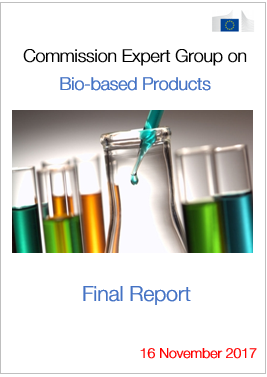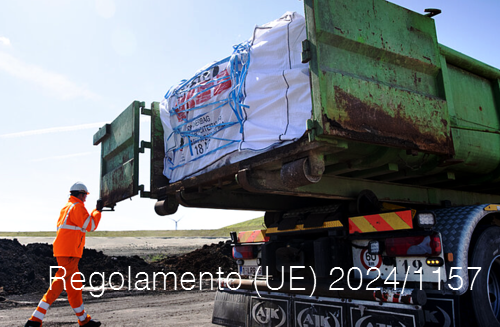
Final report: Bio-based Products
16.11.2017
Commission Expert Group on Bio-based Products Final Report
Increased use of bio-based products can help accelerate the shift towards a more sustainable EU economy, creating both jobs and growth, where both dependence on fossil based carbon and CO2 emissions, are reduced.
In making this transition, for example, through policies dedicated to boosting the competitiveness of EU bio-based products and EU biomass production, bio-based goods will increasingly offer consumer products with enhanced sustainability profiles and new functionalities. The Expert Group on Bio-Based Products (BBP EG) advises the European Commission on the development of this sector. Representing EU countries and state agencies, public procurement experts, standardisation and certification organisations, industry, NGOs and academia, the Expert Group on Bio-based Products has, throughout its mandate, inter alia, provided recommendations on communications and awareness, public procurement and sustainability of bio-based products, which are all relevant to developing new markets through these ongoing processes . In light of the end of the mandate of the group, the aim of this document is to highlight the long-term significance of the sector in meeting some of the EU’s grand challenges, whilst giving an overview of some of the main hurdles which continue to hinder the full exploitation of its potential. Concrete recommendations of policy measures needed to overcome these barriers are also provided.
Milestones
At EU, national, regional and local level, the bioeconomy sector has witnessed several important milestones in recent years. The most significant of these, was the publication of the 2012 EU Bioeconomy Strategy, including various recommendations from the Lead Market Initiative (LMI), aiming to unlock the potential of bio-based product markets. Following its publication, there have been important developments and successes in many areas. These include the design and implementation of many national and regional bioeconomy strategies, the launch of the € 3.7 billion Bio-based Industries Joint Undertaking, initiated largely by proactive members of the Industrial Biotech community, the pulp and paper sector, primary producers, technology platforms and the European Commission, and the setting up of the European Bioeconomy Alliance, a unique cross sectoral coalition dedicated to mainstreaming and realising the potential of the bioeconomy in Europe.
Jobs and growth
Awareness is also growing of the role that bio-based sectors can play in creating a smarter, more sustainable society. This, in turn, has helped attract new investments to the EU, in line with Commission President Jean-Claude Juncker’s priorities, whilst creating additional new jobs and growth. Indeed, rather than being a niche economic area, the bioeconomy is a key contributor to the jobs and growth agenda in Europe. Today, it is already worth over €2.2 trillion whilst providing over 18 million jobs in Europe with great potential to add value and increase competitiveness in many ofits sectors. The bioeconomy also provides a solid foundation on which other infrastructures, industries and systems are being built and made more resource efficient.
Public Procurement
Public procurement can potentially work as a market pull mechanism to stimulate the growth of biobased product markets. On a global level, many states have designed national procurement policies to support specific sectors which, in turn, support their social, environmental and/or economic policies. Considering that bio-based products offer solutions in almost all product areas, the potential for increased public spending on bio-based products is huge. EU governments are significant purchasers of supplies, works and services, and public spending adds up to 19% of their GDP.
Initiatives promoting the procurement of sustainable bio-based products, increasingly accompanied by attractive new functionalities, could complement existing green public procurement as well as public procurement of innovative products and services.
The EU’s Member States however, for a variety of reasons, have rarely integrated considerations of industrial policy in their procurement policies. In some cases this is because public procurement staff is confronted with complex legal requirements when preparing tender specifications whilst in others cases, concerns over possible market distortion present a barrier. Procurers therefore tend to strive for procedures which minimise the likelihood of potential legal dispute or market disruption. This
obstacle prevents public procurement programs from significantly boosting the bio-based industry and the development of new and innovative bio-based products.
Furthermore, there is a lack of capacity to spend time on market exploration activities including market dialogues or trade fares. Often, procurement staff are averse to taking risks in terms of applying innovative procedures or new tender specifications. (e.g. the lowest offer often remains the most frequently used procurement criterion, whilst Total Cost of Ownership (TCO) is less frequently the determining factor). In addition, there is often a high incentive to revert to whichever products were appreciated in the past, which leads to a general lack of innovation in procurement.
Green Public Procurement and a general policy to procure sustainable and environmentally friendly products are supported by many public administrations. However bio-based products do not necessarily fit into these schemes. Often, substantial Life Cycle Assessment (LCA) evidence or other proof of sustainability is required. For bio-based products, with complex value chains and methodological data gaps related to LCA, this evidence can be difficult to provide, and presents an additional financial hurdle which is particularly challenging for SMEs to overcome. Explicit guidance on the procurement of bio-based products, as a dedicated policy target, is rare in public administrations.
The Expert Group was mandated to identify and discuss public procurement – as a demand-side industrial policy instrument for market uptake of bio-based products - as well as to map related activities and examples of good practices at regional, national, international and EU level. The report Recommendations on Public Procurement of Bio-based Products describes the Group’s activities and presents its results and recommendations.
Transition to Circular Economy
Bio-based products will play an increasingly important role in the transition from a linear towards a circular economy. Biorefineries, themselves, are at the heart of the circular economy, playing a vital role in developing and adding value to the principles of a ‘zero-waste’ society. The concept of biorefineries is analogous to that of petrochemical refinery processes, except that biorefineries use renewable instead of fossil carbon based feedstocks. Such feedstocks can include municipal solid waste (where separate collection of organic material is possible and therefore contamination levels with non-organic material are low), and which would otherwise be landfilled or burned, waste from food industry which would otherwise not be reused as well as designated crops and agricultural and forestry waste, which might otherwise be burned or ploughed back into the land. Even taking into consideration the need to ensure the ongoing role of these residues in maintaining soil quality and biodiversity, primary production can play an important role in adding value to these materials which might previously have been considered as ‘wastes’.
The Bio-based Products Expert Group firmly believes that special emphasis should be placed on the contribution of renewable, sustainably sourced and environmentally sound, bio-based products to the development of a resource efficient circular economy. Accordingly, supportive policy signals, measures and incentives are needed in order to stimulate innovation and bio-based product commercialisation in this promising sector, particularly, in an ongoing era of heavily subsidised markets for fossil carbon product development. Coherent, holistic, supportive frameworks, emphasising the link between the circular economy, the Bioeconomy and the role of bio-based products, need to be developed across all relevant areas including agriculture, industry, regions, environment, climate, trade, energy and innovation policies. Therefore, a series of recommendations, to help capture the potential for resource efficiency through bio-based products and processes, are made throughout this final report and, in particular, are the focus of sections 2.7 and 2.9.
Fonte: Commissione Europea
Bio-based products
Bio-based products can make the economy more sustainable and lower its dependence on fossil fuels. For this reason, the EU has declared the bio-based products sector to be a priority area with high potential for future growth, reindustrialisation, and addressing societal challenges. An assessment done by the European Commission has indicated that bio-based products and biofuels represent approximately EUR 57 billion in annual revenue and involve 300,000 jobs. According to forecasts, the bio-based share of all chemical sales will rise to 12.3% by 2015 and to 22% by 2020, with a compounded annual growth rate of close to 20%.
What are bio-based products?
Bio-based products are wholly or partly derived from materials of biological origin, excluding materials embedded in geological formations and/or fossilised. In industrial processes, enzymes are used in the production of chemical building blocks, detergents, pulp and paper, textiles, etc. By using fermentation and bio-catalysis instead of traditional chemical synthesis, higher process efficiency can be obtained, resulting in a decrease in energy and water consumption, and a reduction of toxic waste. As they are derived from renewable raw materials such as plants, bio-based products can help reduce CO2 and offer other advantages such as lower toxicity or novel product characteristics (e.g. biodegradable plastic materials).
Correlati:
Allegati
|
Descrizione |
Lingua |
Dimensioni |
Downloads |
 |
|
EN |
496 kB |
1496 |


































